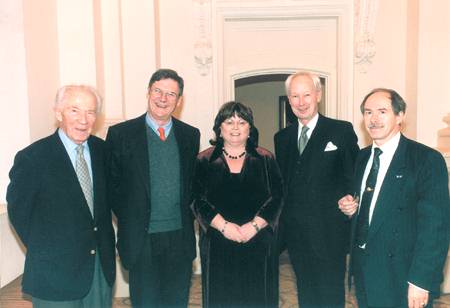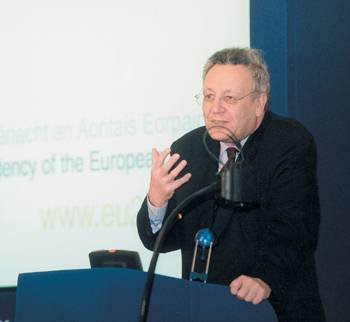| 2004 |

|
YEAR BOOK |
Forf�s
|
Europe's search for excellence in
basic research
|

Drawing on its experience following the identification of the need for, and the establishment of, Science Foundation Ireland, Ireland, as incoming President of the European Union, made the case for the Commission to clearly articulate the need for a new initiative at European level, in advance of discussing issues around mechanisms. In this regard, the Irish Council for Science, Technology and Innovation (ICSTI) set out a series of questions that it recommended the Commission seek to address in its proposed Communication.
In February 2004, the European Commission published a communication on 'Europe and Basic Research'. The respective roles of national governments and the European Community in funding of basic research were considered. Ireland accorded a high priority to this issue during its Presidency and specifically sought to determine if there was a consensus on the need for a European level initiative to improve the quality of basic research.
To determine if such a consensus did exist, the Department of Enterprise, Trade and Employment, and Forf�s, under the auspices of the Irish Presidency of the European Union (EU), and in collaboration with the European Commission, brought together Ministers for research, academics, industrialists and the Commission at a high-level symposium on 'Europe's Search for Excellence in Basic Research' on 16-17 February 2004 in Dublin Castle. The objective of the Symposium was to debate on European performance in basic research and to examine a series of issues including:
-
the existence of a significant gap in excellence in basic research developing between Europe, the US and elsewhere;
-
whether this gap is of a scale that is critically impacting on enterprise development and European competitiveness;
-
what should the vision of Europe be in relation to basic research for 2015; and
-
whether there is a need for a new initiative at European level.
'This high-level symposium will provide a forum for consolidating the debate and moving towards the definition of actions at policy level. Basic science in the longer term has enormous benefits for society; and analysis shows it is one of the most cost-effective investments governments can make. Excellence in basic research is a foundation stone for creating the overall climate of research in Europe that will attract the best scientists and support Europe's ambitions and economic fortunes. It must be central to our strategy for ensuring that Europe can meet the challenge of becoming the most competitive knowledge based economy by 2010,' commented EU Research Commissioner Philippe Busquin.
The Symposium, chaired by Dr Edward Walsh, Chairman, the Irish Council for Science, Technology and Innovation (ICSTI), comprised a unique gathering of over 120 attendees from 27 countries, including Ministers or personal representatives, high level industrialists, academics (including three Nobel Laureates), national research funders and other organisations. Commissioner Busquin, EU Commissioner for Research, and Achilleas Mitsos, Director General for Research, addressed the Symposium.

Areas of Consensus
The Symposium agreed that there is a clear challenge for Europe to enhance the levels of creativity and excellence in basic research in the context of global competition.
A number of areas of consensus were reached at the Symposium. It was agreed that there is a need to enhance the excellence of European research through the partnership of national initiatives. It was also agreed that national initiatives, on their own, would not be sufficient and, therefore, a European initiative would be required. The objectives of this European initiative would be to promote excellence in basic research by promoting international competition among individual research teams. The sole selection criterion should be excellence, identified by international peer review.
The need to create a more attractive basic research environment where excellent researchers are recognised and can excel was also identified. This environment would need to be supported by high quality education, appropriate research funding, research infrastructure, and science-innovation links. It was also noted that Europe should be open to the experience of other parts of the world. It was agreed that industry needs excellent research and excellent people across the full spectrum of research activity, including implementation of the knowledge generated through basic research, as a basis for competitiveness. It was also agreed that there is a need to provide specific funding for basic research of high quality in the next Framework Programme (7th), while maintaining an appropriate balance with other priorities and activities in the research area. In this context, the Symposium welcomed the Commission's proposals for a significant increase in EU research funding, including basic research.
It was agreed that the Commission should bring forward to the EU Competitiveness Council proposals for the governance, management and accountability of a European initiative. This initiative, which must have the complete trust and confidence of the scientific community, should involve a new facility characterised by minimum bureaucracy, involve the scientific and engineering communities, enterprise and academia, in its strategy and overall management. It should award individual grants on a competitive basis.
The Symposium stressed the importance of reinforcing support for basic research in the context of developing the European Research Area. Europe's policy should be vision oriented as it moves to regain its dominant research position. Basic research should be established as an essential pillar of the ERA.
EU Competitiveness Council
The Symposium Conclusions subsequently formed the basis for discussion at the EU Competitiveness Council, chaired by the T�naiste on 11 March 2004. The Competitiveness Council noted that the Dublin Castle Symposium '�recognised that there is a clear challenge for Europe to enhance its levels of creativity and excellence in basic research in the context of global competition, and called for a European initiative to promote excellence in basic research'. It also noted that the Symposium took the view that such an initiative would require specific funding within the 7th Framework Programme, and could imply a new mechanism which should have the full confidence and involvement of the scientific communities and be characterised by minimum bureaucracy. The Council acknowledged therefore the need to examine the case for specific funding within that Programme to support basic research of the highest quality.
A key element in Ireland's Presidency research priorities has been the commitment to progress discussions on assessing the needs of basic research in Europe. This has been assisted by facilitating the frank discussion by research ministers, scientists, industrialists and funders from across Europe at the Dublin Symposium.
EU 7th Framework Programme
It is anticipated that the European Commission will publish a Communication on the future direction of research funding in Europe and the shape of the 7th Framework Programme in 2004. It is anticipated that research proposals of individual researchers will for the first time be eligible for support through this programme and that proposals would be selected on the sole basis of quality of research 'excellence' and evaluated by 'peer review'. This instrument would be used largely for supporting fundamental research.
Contact: Dr Imelda Lambkin, Forf�s; Tel: +353-1-607 3271;
E-mail: [email protected]